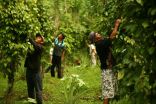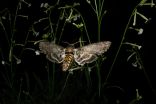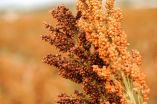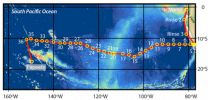Although global concentration of greenhouse gases in the atmosphere has continuously increased over the past decade, the mean global surface temperature has not followed the same path. A team of international reseachers, KIT scientists among them, have now found an explanation for this slowing down in global warming: the incoming solar radiation in the years 2008-2011 was twice as much reflected by volcanic aerosol particles in the lowest part of the stratosphere than previously thought. The team presents their study in Nature Communications (DOI: 10.1038/ncomms8692).
For the lowest part of the stratosphere - i. e. the layer between 10 and 16 kilometres - little information was available so far, but now the international IAGOS-CARIBIC climate project combined with satellite observations from the CALIPSO lidar provided new essential information. According to the study, the cooling effect due to volcanic eruptions was clearly underestimated by climate models used for the last Intergovernmental Panel on Climate Change (IPCC) report. Led by the University of Lund, Sweden, and supported by the NASA Langley Research Center, USA, and the Royal Netherlands Meteorological Institute, three major German atmospheric research institutes were also involved: the Max Planck Institute for Chemistry in Mainz (MPI-C), the Leibniz Institute for Tropospheric Research in Leipzig (TROPOS) and the Karlsruhe Institute of Technology (KIT). Since more frequent volcanic eruptions and the subsequent cooling effect are only temporary the rise of Earths' temperature will speed up again. The reason is the still continuously increasing greenhouse gas concentration, the scientists say.
In the first decade of the 21st century the average surface temperature over the northern mid-latitude continents did increase only slightly. This effect can be now explained by the new study on volcanic aerosol particles in the atmosphere reported here. The study uses data from the tropopause region up to 35 km altitude, where the former is found between 8 km (poles) and 17 km (equator) altitude. The tropopause region is a transition layer between the underlying wet weather layer with its clouds (troposphere) and the dry and cloud-free layer above (stratosphere). „Overall our results emphasize that even smaller volcanic eruptions are more important for the Earth´s climate than expected", summarize CARIBIC coordinators Dr. Carl Brenninkmeijer, MPI-C, and Dr. Andreas Zahn, KIT. The IAGOS-CARIBIC observatory was coordinated and operated by the MPI-C until the end of 2014, since then by the KIT.
To collect their data the team combined two different experimental approaches: sampling and in situ measurements made by IAGOS-CARIBIC together with observations from the CALIPSO satellite. In the IAGOS-CARIBIC observatory trace gases and aerosol particles in the tropopause region are measured since 1997. A modified air-freight container is loaded once per month for four intercontinental flights into a modified Airbus A340-600 of Lufthansa. Altogether about 100 trace gas and aerosol parameters are measured in situ at 9-12 km altitude as well as in dedicated European research laboratories after flight. TROPOS in Leipzig is responsible for the in situ aerosol particle measurements in this unique project. KIT runs 5 of the 15 installed instruments, also the one for ozone. Collected particles are analyzed at the University of Lund, Sweden, using an ion beam accelerator for measuring the amount of particulate sulfur. When comparing this particulate sulfur concentration to the in situ measured ozone concentration this ratio is usually quite constant at cruise altitude. However, volcanic eruptions increase the amount of particulate sulfur and thus the ratio becomes an indicator of volcanic eruption influencing the tropopause region. „The ratio of particulate sulfur to ozone from the CARIBIC measurements clearly demonstrates the strong influence from volcanism on the tropopause region", report Dr. Sandra M. Andersson and Professor Bengt G. Martinsson of the University of Lund, who are the lead authors.
The second method is based on satellite observations. The Cloud-Aerosol Lidar and Pathfinder Satellite Observation (CALIPSO) mission, a collaboration between the National Aeronautics and Space Administration (NASA) in the US and the Centre National d'Etude Spatiale (CNES) in France, has provided unprecedented view on aerosol and cloud layers in the atmosphere. Until recently, the data had only been scrutinized above 15 km, namely where volcanic aerosol are known to affect our climate for a long time. Now also aeorosol particles of the lowermost stratosphere have been taken into account for calculating the radiative balance of the atmosphere, to evaluate the impact of smaller volcanic eruptions on the climate.
The influence from volcanic eruptions on the stratosphere was small in the northern hemisphere between 1999 and 2002. However, strong signals of volcanic aerosol particles were observed between 2005 and 2012. In particular three eruptions stand out: the Kasatochi in August 2008 (USA), the Sarychev in June 2009 (Russia), and the Nabro in June 2011 (Eritrea). Each of the three eruptions injected more than one megaton sulfur dioxide (SO2) into the atmosphere. „Virtually all volcanic eruptions reaching the stratosphere lead to more particles there, as they bring in sulfur dioxide, which is converted to sulfate particles", explains Dr. Markus Hermann of TROPOS, who conducts the in situ particle measurements in CARIBIC.
Whether a volcanic eruption has a global climate impact or not depends on several factors. There is the amount of volcanic sulfur dioxide as well as the injection height. But also the latitude of the eruption is important: As the air flow in northern hemispheric stratosphere is largely disconnected from the southern hemisphere, only volcanic eruptions near the equator can effectively distribute the emitted material over both hemispheres. As in the Tambora eruption on the Indonesian Island Sumbawa 200 years ago. This eruption led to such a strong global cooling that the year 1816 was called „year without summer", including worldwide crop failures and famines. Also the Krakatau eruption 1883 on Indonesia or the Pinatubo 1991 on the Philippines led to noticeable cooling. The present study now indicates that „the cooling effect of volcanic eruptions was underestimated in the past, because the lowest part of the stratosphere was mostly not considered. Interestingly our results show that the effect also depends on the season. The eruptions investigated by us had their strongest impact in late summer when the incoming solar radiation is still strong", explains Dr. Sandra M. Andersson.
INFORMATION:
Publication:
Sandra M. Andersson, Bengt G. Martinsson, Jean-Paul Vernier, Johan Friberg, Carl A. M. Brenninkmeijer, Markus Hermann, Peter F. J. van Velthoven & Andreas Zahn (2015): Significant radiative impact of volcanic aerosol in the lowermost stratosphere.
Nature Communications, doi: 10.1038/ncomms8692.
http://www.nature.com/ncomms/index.html
The research was funded by the German Federal Ministry of Education and Research (BMBF; financing the instruments operation of IAGOS-D) and the German Research Foundation (DFG; Priority Programme HALO/SPP 1294). The Deutsche Lufthansa AG (CARIBIC-Observatory) and the NASA Langley Research Center (aerosol measurements by CALIPSO) support the study.
For further information on the CARIBIC project, please click:
http://www.caribic-atomospheric.de
More about the KIT Climate and Environment Center: http://www.klima-umwelt.kit.edu/english
For further information, please contact:
Margarete Lehné, Press Officer , Phone: +49 721 608-48121, Fax: +49 721 608-43658, E-Mail: , margarete.lehne@kit.edu
Karlsruhe Institute of Technology (KIT) is a public corporation pursuing the tasks of a Baden-Wuerttemberg state university and of a national research center of the Helmholtz Association. The KIT mission combines the three core tasks of research, higher education, and innovation. With about 9,400 employees and 24,500 students, KIT is one of the big institutions of research and higher education in natural sciences and engineering in Europe.
Since 2010, the KIT has been certified as a family-friendly university.
The photo of printing quality may be requested by mail to presse@kit.edu or phone: +49 721 608-47414.







